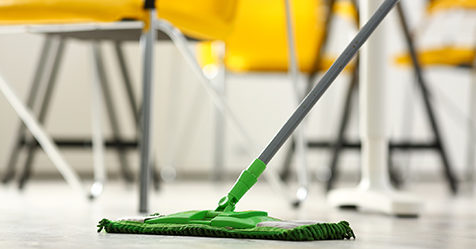In the past, when consumers planned a large purchase, they asked for recommendations from family, friends or coworkers.
Fast-forward to today’s era of the “connected customer” — the vast world of online reviews combined with growing social media use provides unlimited information about others’ purchase experiences at the press of a button.
It’s no different for the increasingly competitive hospitality industry, where an unsatisfied customer can quickly transform into a whirlwind of negative reviews.
This can lead to a poor online reputation and dwindling occupancy levels.
To meet evolving needs of the “connected customer,” hotels can build a strong online reputation by focusing on building the four pillars of guest satisfaction: image, cleanliness, safety and security.
By keeping these four pillars in mind and envisioning the customer experience from start to finish, hoteliers can increase customer satisfaction and improve online reputation for the long-term.
Image
When considering the image of your hotel, think about the entire customer experience.
As with anything, first impressions are critical.
Since staff members will likely present a first point of contact for guests, ensure their appearance and attitude is at the top of its game to create a lasting impression.
Provide staff members with functional, stylish and comfortable uniforms to maintain a professional look at all times.
Hoteliers can consider partnering with a qualified uniform provider that understands its property’s unique image and how to promote a cohesive, consistent brand through an apparel program.
When employees look their best, they will feel their best and be able to more confidently and efficiently deliver outstanding guest experiences.
In addition, the appearance of the hotel lobby and entrance will be a key area that customers immediately notice.
Ensure that front doors, lobby and check-in counters are kept clean through comprehensive deep cleaning programs that go beyond daily cleaning techniques.
Partner with a deep cleaning provider that can develop a custom plan that meets the needs of the hotel which focuses on critical areas, such as flooring, counters and other fixtures in the lobby and entrances.
Cleanliness
After focusing on employee appearance, entrances and lobbies, consider the next customer touch-point after check-in: guest rooms.
A clean, odor-free room is a basic, yet critical way to provide an exceptional stay for guests and provide a lasting impression.
As guests enter rooms, ensure they are always met with fresh linens, spot-free carpets, clean restrooms and a pleasant odor.
To keep carpets in top condition, use a deep cleaning provider with services that are Platinum-certified by the Carpet and Rug Institute (CRI) and use a combination of steam, agitation and extraction to ensure the highest level of cleaning efficacy.
Consider carpet treatments such as a stain-repellant to maintain high levels of cleanliness in between deep cleanings.
For tile in guest restrooms, use deep cleaning services to make sure grout lines are free of buildup and odor-causing contaminants are removed.
Air conditioning units can also be a common source of odor, so it’s important to routinely deep clean units to improve indoor air quality and remove unpleasant odors from guest rooms.
Partner with a coil cleaning provider that goes beyond cleaning basics by focusing on sanitation and mold prevention techniques.
Deep cleaning A/C units will enable guests to breathe more easily and reduce overall energy consumption throughout the guest rooms.
Between deep cleanings, maintain high levels of cleanliness by providing the appropriate tools and supplies for housekeepers.
Provide fully stocked cleaning carts and chemicals to help housekeepers efficiently tend to guest rooms and common areas.
Tools such as microfiber cloths, air fresheners and high-efficiency vacuums help to maintain cleanliness in guest rooms on a daily basis.
Consider placing a chemical dispensing unit in housekeepers’ storage areas on each floor to ensure the correct dilution is mixed each time.
Dispensing units also help employees by limiting their contact with irritating chemicals and eliminating the time required to manually dilute cleaning solutions.
When auditing room cleanliness, take a holistic approach and make sure to assess not only results, but also the entire cleaning process.
Safety
Another critical area that may have a lasting impact on guest experience is safety.
One misstep from hotel management to ensure guest safety during an emergency can cause a whirlwind of negative reviews and a damaged reputation.
Keep guest safety top of mind by equipping the hotel with up-to-date fire extinguishers, automatic external defibrillators (AEDs), fire and smoke alarm systems, emergency lights and illuminated exit signs.
The placement of AEDs in hotel gyms, swimming and recreation areas is critical to maximize guest safety.
All emergency systems at the hotel should be inspected each month by a licensed emergency protection provider to ensure they are always functional.
Having the right safety equipment on site is just half of the equation.
To fully prepare for any emergency situation, hold safety training sessions for all employees — from front desk agents to housekeepers and bellmen.
Fire safety training should include the proper use of extinguishers and AEDs, basic first aid response, CPR and appropriate evacuation techniques.
Clearly detail emergency evacuation procedures and display them prominently throughout the property.
In addition to emergency preparation, consider daily operations and items that can affect guest safety such as broken locks or doors.
Perform frequent checks on all areas that may impact guest safety and if something is broken or even slightly damaged, fix it immediately.
By proactively staying on top of the condition of hotel fixtures, hoteliers can do their part to keep guests safe and satisfied.
Security
Each day, a hotel collects an extensive amount of sensitive and confidential guest information through bookings, loyalty programs and on-site purchases.
Ensure that guests’ personal information remains secure by partnering with a comprehensive document shredding provider.
Work with the provider to create a schedule for the pick-up of sensitive documents that need shredding.
Limit access to private spaces such as offices or business centers and keep shredding bins in each area where sensitive information might be collected.
Shredding services can also help the hotel stay compliant with increasing enforcement of data privacy laws.
When guests notice the hotel’s dedication to their security, they will feel more comfortable and able to enjoy their stay.
While the era of the “connected consumer” provides many challenges for the hospitality industry, it presents far more opportunities to get the guest experience right.
By considering the guest experience from all angles and using the four pillars to build a strong foundation for satisfaction, hotels can ensure positive guest experiences trickle across to review sites — providing a great online reputation and high occupancy levels for the long-term.



